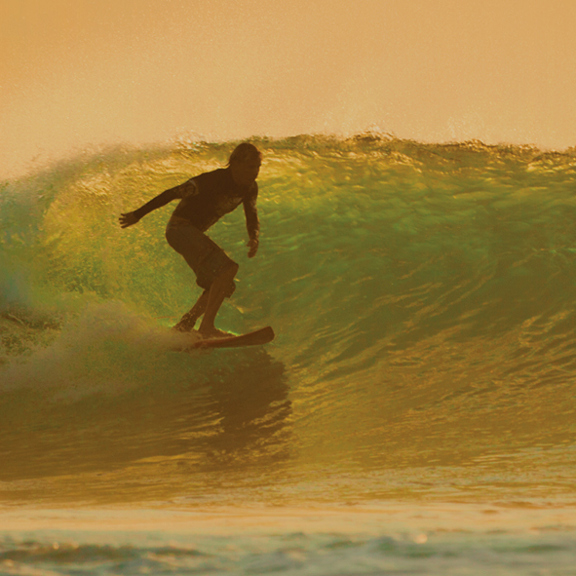
The History of Surfing: From Royal Hawaiian Tradition to 2020 Olympic Sport
A buzzing beachfront view overlooking the iconic Waikiki Bay awaits visitors as they walk into Duke's Waikiki, a beloved local haunt that's a must-visit for visitors on Oahu. Named in homage to Duke Kahanamoku, the founding father of modern surfing, grabbing cocktails and pupus at Duke's while watching surfers ride the waves seems more relevant than ever.
A Royal Tradition
Originating in ancient Polynesia, the art of he 'e nalu or surfing has been around for thousands of years in the Pacific, thanks in part to the region's warm waters, open-access beaches, and most importantly, ideal swell. Petroglyphs carved in lava rock and oral history dating back to the 1500s indicate that surfing was a sporting activity enjoyed by Hawaiian royalty.
Aliʻi nui or high chiefs would be seen surfing the waves on Olo, 14-16 foot long round-nosed wiliwili wood boards weighing up to 175lbs. For makaainanas' or commoners, Alai boards made of koa wood were slightly smaller, at 10-12 foot long, and the preferred surfboard of choice.
Surfing, along with surfboards, continued to be a sacred tradition practiced by both Hawaii's royalty and its common people until the arrival of the Christian missionaries in the early 1800s. The new, strict Christian values proved to be devastating for the ancient Hawaiian way of life, leading to many changes, one of which being a restriction on the act of surfing.
The Rise of "The Duke"
Following a revival of the ancient sport by King Kalakaua in the late nineteenth century, surfing once again began to gain favor in the eyes of the Hawaiians with Duke Paoa Kahanamoku starting the Hui Nalu surf club for native Hawaiians.
As an impressive and avid swimmer, Duke went on to win two Olympic Medals in Stockholm in 1912, two in the 1920 Antwerp Olympics, and yet another at the Paris Olympics in 1924. At age 42, he was awarded a bronze medal in the Los Angeles Olympics for water polo.
His love of surfing, however, was instrumental in introducing the sport to California, the East Coast of the United States, and even west across the Pacific Ocean, to the sunny shores of Australia and New Zealand.
To the 2020 Olympics
From lighter surfboards made of fiberglass and epoxy to surfers chasing bigger, killer waves along the North Shore, the sport of surfing has come a long way since its ancient inception. Today both men and women passionately compete in surf championships held all around the world, some of whom you get the chance to meet at our Surfers in Residence program at the Outrigger Waikiki Beach Resort.
And, with the International Olympic Committee officially recognizing surfing as an Olympic sport for the 2020 Tokyo Games, Duke's hopes that surfing would someday become an Olympic sport are finally coming to fruition a hundred years later. For the first time ever, after a final confirmation vote by the International Olympic Committee, surfing will join longstanding sports like skateboarding, sport climbing, softball, baseball and karate as new additions to the Olympic Games.
Experience It Firsthand in Waikiki
Get a front row seat to all the surfing action here!